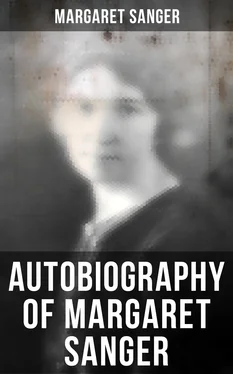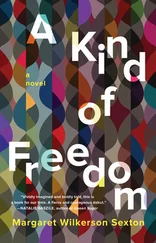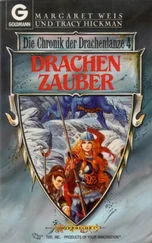1 ...7 8 9 11 12 13 ...30 Messages were coming to me from a young man going West, postmarked Chicago or San Francisco. These daily letters and sometimes telegrams as well, were not father’s idea of wooing. What could anyone have to say every day? To his way of thinking, a decent man came to the house and did his talking straight; he sat around with the family and got acquainted. Father said, “That fellow’s a scoundrel. He’s too worldly. He’s not even known in town.”
We had to ask permission whether Tom or Jack or Henry could call. Without reason or explanation father said, “No,” and that was an end to it. If we went out, we had to be back at ten and give an account of ourselves.
Then came the climax. Ethel and I had gone to an open-air concert. On the stroke of ten we were a full block away from home running with all our might. When we arrived, three minutes late, the house was in utter darkness—not a sight nor sound of a living creature anywhere. We banged and knocked. We tried the front door, the back, and the side, then again the front. It opened part way; father looked out, reached forth a hand and caught Ethel’s arm, saying, “This outrageous behavior is not your fault. Come in.” With that he pulled her inside, and the door slammed, leaving me in the dark, stunned and bewildered. I did not know this monster.
Hurt beyond words, I sat down on the steps, worrying not only about this night but about the next day and the next, concerned over the children left at home with this new kind of father. I was sure if I waited long enough he would come out for me, but it was a chilly evening in October. I had no wrap, and began to grow very cold.
I walked away from the house, trying to decide where I should go and what I should do. I could not linger on the streets indefinitely, with the possibility of encountering some tipsy factory hand or drummer passing through. At first there seemed no one to turn to. Finally, exhausted by stress of emotion, I went to the home of the girl who had been with us at the concert. She had not yet gone to bed, and her mother welcomed me so hospitably that I shall be eternally grateful. The next morning she lent me carfare to go to Elmira, where I had friends with whom I could stay.
Meantime father had found me gone. He had dressed and tramped up and down First Street, searching every byway, inquiring whether I had been seen. When he had returned at daybreak to find me still missing he had sent word to Mary, who received his message at almost the same time as one from me, telling her not to worry; I was all right. Both of them urged me to come back to Corning, and in a few days I did so, taking up again my responsibilities. Father and I tried to talk it over, but we could not meet on the old ground; between us a deep silence had fallen.
Father had almost stopped expounding; instead, he was reading more. Debs had come on his horizon, and the Socialist papers cropping up all over the country were appearing in the house. From the Free Library, which he had helped to establish years earlier, he was borrowing Spencer, who was modern for that time, and other books on sociology.
I had given up encouraging young men to see me, but I, too, was patronizing the library. My books were fiction. “All nonsense,” father snorted at the mention of such titles as Graustark, Prisoners of Hope, or Three Musketeers. The word “novel” was still shocking to many people, and he classed them all as “love stories.” “Read to cultivate and uplift your mind. Read what will benefit you in the battle of life,” he admonished. But I continued my escape from the daily humdrum to revel in romances, devouring them in the evenings and hiding them under the mattress during the day.
One noon when I was waiting for the children to come in to lunch I was buried in David Harum, finding it very funny, and did not hear father enter. He stood ominously in the doorway. I should have felt trapped, but, instead, without warning and without reason, the old love flamed up again. I laughed and laughed. I was no longer afraid nor did I care for his scowls or his silly old notions. The long silence was broken.
“Do listen to this.” And I started reading. The frown began to melt away and soon father too was chuckling. This was the first laughter that had been heard in that dreary household since mother’s death. The book disappeared into his room, and soon thereafter he was caught seeking more of “that nonsense.”
At last I realized why father had been so different. He had been lonely for mother, lonely for her love, and doubtless missed her ready appreciation of his own longings and misgivings. Then, too, he had always before depended on her to understand and direct us. He was probably a trifle jealous, though not consciously, because he considered jealousy an animal trait far beneath him, and refused to recognize it in himself. Nevertheless, beaus had been sidetracking the affections of his little girls. So oppressed had he been by his sense of responsibility that he had slipped in judgment and in so doing slid into the small-town rut of propriety. His belated discipline, caused by worry and anxiety, was merely an attempt to guide his children.
I, however, considered the time had passed for such guidance. I had to step forth by myself along the experimental path of adulthood. Though the immediate occasion for reading medical books had ceased with mother’s death, I had never, during these months, lost my deep conviction that perhaps she might have been saved had I had sufficient knowledge of medicine. This was linked up with my latent desire to be of service in the world. The career of a physician seemed to fulfill all my requirements. I could not at the moment see how the gap in education from Claverack to medical school was to be bridged. Nevertheless, I could at least make a start with nursing.
But father, though he proclaimed his belief in perfect independence of thought and mind, could not approve nursing as a profession, even when I told him that some of the nicest girls were going into it. “Well, they won’t be nice long,” he growled. “It’s no sort of work for girls to be doing.” My argument that he himself had taught us to help other people had no effect.
Father’s notions, however, were not going to divert me from my intention; no matter how peaceful the home atmosphere had become, still I had to get out and try my wings. For six months more we jogged along, then, just a year after mother had died, Esther asked me to visit her in New York. I really wanted to train in the city, but her mother knew someone on the board of the White Plains Hospital, which was just initiating a school. There I was accepted as a probationer.
Chapter Four DARKNESS THERE AND NOTHING MORE
Table of Contents
The old White Plains Hospital, not at all like a modern institution, had been a three-storied manor house, long deserted because two people had once been found mysteriously dead in it and thereafter nobody would rent or buy. The hospital board, scoffing at superstition, had gladly purchased it at the low price to which it had been reduced. However, in spite of rearrangements and redecorating, many people in White Plains went all the way to the Tarrytown Hospital rather than enter the haunted portals.
Once set in spacious grounds the building was still far back from the road; a high wall immediately behind it shut off the view of the next street and nothing could be seen beyond except the roof of what had been the stable. The surrounding tall trees made it shadowy even in the daytime. To reach the office you had to cross a broad pillared veranda. Parlor and sitting room had been thrown together for the male ward, and an operating room had been tacked on to the rear. The great wide stairway of fumed oak, lighted at night by low-turned gas jets, swept up through the lofty ceiling. On the second floor were the female ward and a few private rooms. The dozen or so nurses slept in the made-over servants’ quarters under the gambrel roof.
Читать дальше












